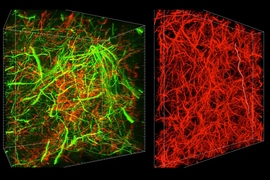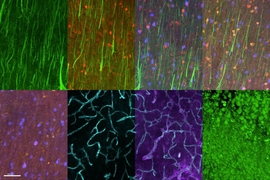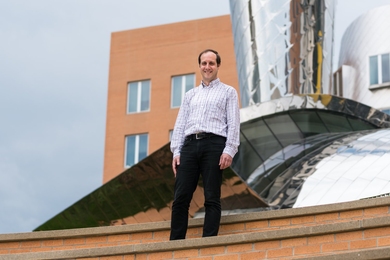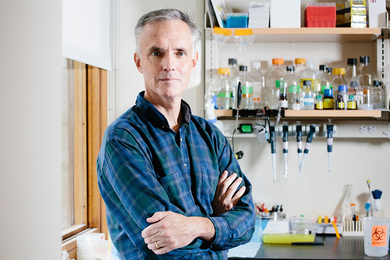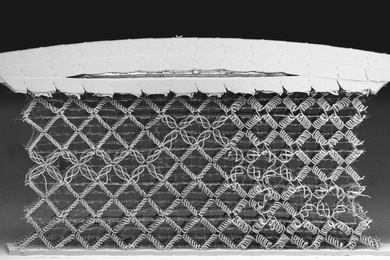This article is adapted from a National Institutes of Health press release.
Kwanghun Chung, the Samuel A. Goldblith Career Development Assistant Professor in Chemical Engineering at MIT; a core faculty member of the Institute for Medical Engineering and Science; a core member of the Picower Institute for Learning and Memory; and an associate member of the Broad Institute was selected to receive a 2016 NIH New Innovator Award for his project, “Proteome-Driven Holistic Reconstruction of Organ-Wide Multi-Scale Networks.”
Chung’s research has focused on developing new techniques to produce comprehensive, high-resolution maps of complex organs such as the brain. In his project abstract, Chung proposes “a holistic approach for studying organ-wide functional networks at multiple scales through the development of pioneering technologies that enable proteomic reconstruction of organs at unprecedented resolution.” Current biological methodology requires dividing biological systems into “known cell types and then separately studying each population,” which Chung says can ignore important but unidentified functional networks. With the award, Chung plans to develop technologies that can enable more holistic understanding of these complex biological systems.
The 2016 NIH High-Risk, High-Reward (HRHR) research awards — of which the New Innovator Awards are a subcategory — were given to 88 highly creative and exceptional scientists with bold approaches to major challenges in biomedical research. The awards span the broad mission of the NIH and include groundbreaking research, such as engineering immune cells producing drugs at the site of diseased tissue; developing a sensor to rapidly detect antibiotic resistance of a bacterial infection; understanding how certain parasites evade host detection by continually changing their surface proteins; and developing implants that run off the electricity generated from the motion of a beating the heart.
“The program continues to support high-caliber investigators whose ideas stretch the boundaries of our scientific knowledge,” said NIH Director Francis S. Collins. “We welcome the newest cohort of outstanding scientists to the program and look forward to their valuable contributions.”
NIH traditionally supports research projects, not individual investigators. However, the HRHR program seeks to identify scientists with ideas that have the potential for high impact, but may be at a stage too early to fare well in the traditional peer review process. These awards encourage creative, outside-the-box thinkers to pursue exciting and innovative ideas in biomedical research.
The High-Risk, High-Reward research program, part of the NIH Common Fund, manages the following four awards:
- The Pioneer Award challenges investigators at all career levels to pursue new research directions and develop groundbreaking approaches with a high impact on a broad area of biomedical or behavioral science.
- The New Innovator Award supports unusually innovative research from early career investigators who are within 10 years of their terminal degree or clinical residency and have not yet received a research project grant (R01) or equivalent NIH grant.
- The Transformative Research Award promotes cross-cutting, interdisciplinary approaches and is open to individuals and teams of investigators who propose research that could potentially create or challenge existing paradigms.
- The Early Independence Award provides an opportunity for exceptional junior scientists who have recently received their doctoral degree or finished medical residency to skip traditional postdoctoral training and move immediately into independent research positions.
In 2016, the NIH issued 12 Pioneer awards, 48 New Innovator awards, 12 Transformative Research awards, and 16 Early Independence awards. The awards total approximately $127 million and represent contributions from the NIH Common Fund; the National Cancer Institute; National Heart, Lung, and Blood Institute; National Institute of Environmental Health Sciences; National Institute of General Medical Sciences; National Institute of Mental Health; and the Big Data to Knowledge initiative.
The NIH Common Fund encourages collaboration and supports a series of exceptionally high-impact, trans-NIH programs. Common Fund programs are designed to pursue major opportunities and gaps in biomedical research that no single NIH Institute could tackle alone, but that the agency as a whole can address to make the biggest impact possible on the progress of medical research.
A full listing of New Innovator awardee bios and projects can be found on the NIH website.

